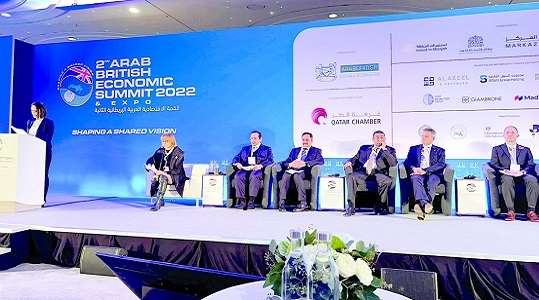The Union of Arab Chambers Secretary-General, Dr. Khaled Hanafi, stressed during a speech he delivered at the second Arab Economic Summit, which was held in London, “The depth of Arab-British relations, and the importance of strengthening this relationship to the level of strategic partnership, in light of the changes taking place on the global scene, especially since the start of the Corona pandemic, whose repercussions are continuing on other economies of the world, and then the ongoing war in Ukraine came to darken the global scene, which necessitates moving forward in pushing relations between countries, especially Arab-British relations, to the hoped-for level.”
Hanafi called for "the necessity of moving the relationship between the two sides from the current reality based on import and export, to a new strategic reality that aligns with the changes in the reality of the global economy, especially the Fourth Industrial Revolution and the digital revolution."
He stressed that "Arab economies are in fact divided into rich economies and are witnessing progress in various sectors and fields, such as the Arab Gulf states, and the Arab Republic of Egypt is witnessing an unprecedented renaissance and attracting huge investments in recent years. While other Arab countries are facing political and security crises that have greatly affected their economic reality, and from this point of view, Arab-British cooperation must be strengthened in accordance with the reality of the economies of Arab countries and the investments they need in various sectors and fields.”
He noted, "What we need today is a bold vision to develop trade that keeps pace with technological patterns to expand and deepen sustainability, diversity, and value," considering that "sustainable development and further diversification mean new opportunities for British-Arab cooperation."
He continued, "New trade deals need supply networks that are in line with green technology, or those that are not subject to tariffs in environmentally preferred products, as trade can help adaptation in the provision of low-emission goods and services and facilitate the use of environmentally friendly technologies."
Hanafi talked about the great development taking place in terms of launching free trade negotiations between the United Kingdom and the Gulf Cooperation Council countries, which would raise the volume of trade exchanges between the two sides to between 35-40 billion dollars. Considering that "free trade agreements between the United Kingdom and Arab countries contribute to opening markets for companies by addressing trade barriers and barriers, and in return, they not only create better business for large companies but also provide a golden opportunity and many advantages to develop and strengthen small and medium companies."
Hanafi stressed, "The Arab region is a major global trade route linking the continents of Asia, Africa, and Europe with the whole world, allowing access to the markets of 2 billion consumers by virtue of its strategic location." He pointed out "Arab countries are witnessing huge investments in the logistics sector, infrastructure, and logistical networks, and therefore there are great opportunities in huge markets to further develop logistics services such as hub ports and transport networks across the region."
He highlighted, "Today there are tremendous opportunities in key and new sectors such as industries based on the fourth industrial revolution, where artificial intelligence is reshaping the world in business and consumer markets. This is in addition to the untapped potential in the field of alternative energy in the Arab region, where renewable energy provides only 4.1 percent of the total final energy consumption in the Arab region, compared to a global average of 18 percent.”
He emphasized, "The pace of change taking place worldwide is rapid, and therefore facing this reality, we have no better choice but to work together, communicate with our partners and invest in skills, technologies, and resources that will contribute to the growth and renaissance of our countries and peoples."
Source (Union of Arab Chambers)

